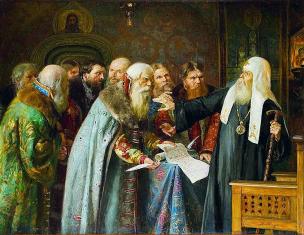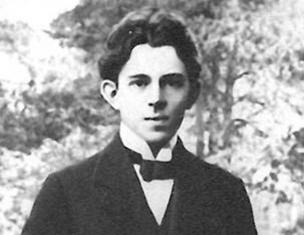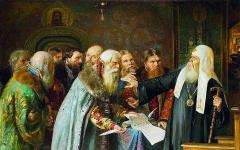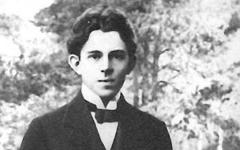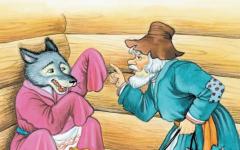Theory: Features of the poetic style of Tyutchev and Fet
| Tyutchev | Fet |
| The philosophical character of poetry, in which thought always merges with the image. In poetry, Tyutchev strives to comprehend the life of the Universe, to comprehend the secrets of space and human existence. | The tragic nature of the lyrics, the dominant feeling is tension, at the same time, the light and optimism inherent in Fet's poetry. Dialectics of tragedy and joy, overcoming dramatic situations with a sense of harmony of the world |
| Life is a confrontation between hostile forces. Dramatic perception of reality combined with an inexhaustible love of life | Beauty in his poems is suffering overcome, joy gained from pain. Life in Fet's poems is a moment fixed in eternity |
| The human “I” in relation to nature is not a drop in the ocean, but two equal infinities. The internal, invisible movements of the human soul are consonant with the visible dialectics of natural phenomena | The impressionistic nature of the depiction of feelings, their fragmentation and extreme imagery. The strict artistic structure of the poems, their internal balance and the feeling of sketchiness, deliberate raggedness |
| The figurative system of lyrics combines objective realities outside world and subjective impressions of this world made on the poet. Mastery in depicting the harmony of the objective realities of the external world and the depth of the internal world | Increased metaphorical nature of poetry, dynamism and musicality artistic images. Predominance of mood over thought, thought “dissolved” in music |
| The poet's skill in creating phonetic and pictorial images, combining sound recording with an unexpected palette of colors and color images | Mastery in the use of parallelisms, repetitions, periods, rhythmic pauses, richness and depth of poetic intonations, sound instrumentation |
Assignments: read F. Tyutchev’s poems “The earth still looks sad...” and A. Fet’s poem “Still fragrant bliss of spring...” and write a comparative analysis of these works according to plan:
· Identify the features of the artistic form of each poem. What poetic meaning can be seen in this?
· What are these poems about? Do they have allegorical overtones?
· Compare the vocabulary, syntax, poetic intonations of the poems.
· Draw conclusions about the similarities and differences between the feelings and artistic images of these poems.
· Draw conclusions about the main features of the poetic style of Tyutchev and Fet, manifested in these poems.
Independent work № 16.
Topic: N.A. Nekrasov “Who lives well in Rus'.” Moral issues of the poem.
Theory: textbook by Yu.V. Lebedev “Literature. 10th grade. Part 1", pp. 134 – 15.
Forms of plot development.
Assignments.
1. Read the textbook article about the poem “Who Lives Well in Rus'” pp. 134 – 157 and excerpts from the poem in the textbook’s anthology on p. 390. Prepare answers to the questions orally.
1. What role does the prologue play in the plot-compositional structure of the poem?
2. What thoughts and feelings does the description of a fight between men in a fairy-tale forest give rise to?
3. Tell us about the meeting of the peasants with the priest, the landowner, and Ermil Girin. Find the lines that talk about what each of them includes in the ideal of happiness.
4. How is landowner Rus' presented in the text?
Independent work No. 17.
Topic: A.K. Tolstoy. Review of creativity.
Theory: textbook Yu.V. Lebedev “Literature. 10th grade. Part 2", pp. 184 – 199
Options for tasks.
Do one of your choice:
1. Prepare a report on the life and work of A.K. Tolstoy
2. Compare A. K. Tolstoy’s poem “You know the land...” with M. Yu. Lermontov’s poem “Motherland”
Independent work No. 18.
Topic: Poetry lesson A. Maikov, A. Grigoriev, Y. Polonsky
Theory: textbook Yu.V. Lebedev “Literature. 10th grade. Part 2".
Quests: prepare a report on the work of one of the poets (A. Maykova, A. Grigoriev, Y. Polonsky), learn one poem by heart.
Independent work No. 19.
Topic: F.M. Dostoevsky. Essay on life and creativity.
Theory: textbook by Yu.V. Lebedev “Literature. 10th grade. Part 2", pp. 216 – 225.
Exercise.
Read the theoretical material of the textbook (Yu.V. Lebedev Literature. Grade 10. Part 2) on pp. 216 - 225 and make a note on the following theses:
1) Writer's debut;
2) Dostoevsky and the Petrashevsky circle;
3) Dostoevsky in hard labor;
4) Dostoevsky and the problem of faith;
5) The main works of Dostoevsky.
Independent work No. 20.
Topic: F.M. Dostoevsky “Crime and Punishment.” Raskolnikov's revolt - causes and results. Theory " strong personality"and its refutation in the novel.
Theory.
The theory of "Napoleonism" comes down to the formula: “Freedom and power, and most importantly - power!” In Dostoevsky's novel, Napoleon's name is mentioned several times. The interest in him in Russia in the 60s is not accidental. The development of bourgeois relations exacerbates social contradictions, leading to the impoverishment of the broad masses. The search for ways to transform society leads to the birth of all kinds of theories, including the idea of a “strong personality” capable of subjugating people and turning them into a tool to achieve their goals.
Raskolnikov's theory arises on this historical basis. He sees suffering common man, understands that their reason is social injustice. What to do? Resign yourself? Fight? In his opinion, to enter into single combat with this crazy and dirty world Only an extraordinary person can. He comes to the conclusion that humanity is divided into two categories: ordinary people, who make up the majority, and extraordinary people, such as Napoleon, who, if necessary, will not stop at crime.
The idea of Raskolnikov's theory is expressed in the painful question: “Am I a trembling creature or do I have the right?” And he convinces himself that he is an extraordinary person, a born “master of fate.” He needs power in order to save Polechka, Sonya, Katerina Ivanovna - all suffering humanity. The murder of the harmful, greedy old woman was conceived by Raskolnikov as a test of his terrible theory on a particular case. This leads to the conclusion formulated by the hero himself: “I wanted to become Napoleon, that’s why I killed him.”
The collapse of Raskolnikov's theory lies in his mistake: he sees the causes of social evil not in the structure of society, but in human nature itself. Instead of fighting against the immoral system and its laws, our hero wants to follow them. And as a result, he loses faith in himself, in his previous beliefs, and experiences endless self-loathing. Instead of happiness, he inevitably brings evil to himself, his loved ones, and innocent people. Hence his despair: “I killed myself, not the old woman.”
Quests:
1. Re-read the contents of Raskolnikov’s article “On the Right of a Strong Personality”
Fill in the missing lines below (in writing in your notebook):
1) Raskolnikov is convinced (he “believes”) that all people by nature are divided into ____ categories: _________________. “Ordinary” people are people who “live in obedience”; they do not have a “new word.” “Extraordinary” people -______________________. All of them _________: “transgress the law” tacitly accepted by the majority.” These are strong people.
2) “Extraordinary” people can allow themselves to _______________________________________
2. Read the following reflections by Raskolnikov: “The legislators and founders of humanity, starting with the ancients, continuing with the Lycurgus, Mohammeds, Napoleons and so on, each and every one of them were criminals, for the very fact that, by giving a new law, they thereby violated the ancient one, sacredly revered by society and handed down from the fathers, and certainly, not stopping at blood, if only blood (sometimes completely innocent and valiantly shed for the ancient law) could help them.” Draw a conclusion about how Raskolnikov comes to his “idea” (orally).
Write a miniature essay “What is the essence of Raskolnikov’s theory, is it relevant today?”
Independent work No. 21.
Questions and tasks for comparative analysis
1. What are these poems about? Do they have allegorical overtones?
3. How is the poetic concept of Tyutchev’s world and Fet’s world reflected in each of the poems?
4. Identify the features of the artistic form of each poem. What poetic meaning can be seen in this?
5. Compare the vocabulary, syntax, poetic intonations of the poems. Draw conclusions about the similarities and differences between the feelings and images of these poems.
6. Draw conclusions about the main features of the poetic style of Tyutchev and Fet, manifested in these poems.
At the beginning of the lesson, the teacher, together with the class, draws up a summary table, which is written down in notebooks.
Features of the poetic style of Tyutchev and Fet
| Tyutchev | Fet |
| The philosophical nature of the lyrics, the thought in which always merges with the image. The poet’s desire to comprehend the life of the Universe and man’s place in it, to comprehend the secrets of space and human existence | The tragic nature of the lyrics, the dominant feeling is tension. At the same time, Fet’s poetry is characterized by light and optimism. Dialectics of tragedy and joy, overcoming dramatic situations with a sense of harmony of the world |
| Life, according to Tyutchev, is a confrontation between hostile forces. But the dramatic perception of reality is combined with inexhaustible love for all its manifestations. Love, according to Tyutchev, is almost always a tragedy leading to hopelessness and death, but it is love that gives a person the greatest spiritual rise, a feeling of happiness | Life in Fet's poems is a moment fixed in eternity. Beauty in his poems is suffering overcome, joy gained from pain. Love is also a manifestation of the primordial beauty and harmony of the world, which help a person to rise above everyday life and find a foothold for spiritual impulses |
| The human “I” in relation to nature is not a drop in the ocean, but two equal infinities. The invisible movements of the human soul are in tune with the visible dialectics of nature. Day and ordinary life are veils that hide the primordial chaos of the world, visible at night. The human soul is initially also chaos. | The impressionistic nature of the depiction of feelings, their fragmentation and extreme imagery. At the same time, the strict artistic structure of the poems and their internal balance are combined with a feeling of sketchiness and deliberate raggedness. |
| The figurative system of lyrics combines the objective realities of the external world and the subjective impressions of this world made on the poet. Mastery in depicting the harmony of the objective realities of the external world and the depth of the internal world | Unexpected and bright colors, sounds, smells of the world are created by the increased metaphorical nature of the poems, the dynamism and musicality of artistic images. Mood prevails over thought, thought is “dissolved” in music, which is also a manifestation of beauty |
| The poet's skill in creating phonetic and pictorial images, combining sound recording with an unexpected palette of colors and color images | Mastery in the use of parallelisms, repetitions, periods, rhythmic pauses, richness and depth of poetic intonations, sound instrumentation |
Topics of essays on the lyrics of Tyutchev and Fet
1. Is it possible to hear the “beat of the soul” of the poet in Tyutchev’s lyrics?
2. What is the dialectic between nature and the inner world of man in Tyutchev’s lyrics?
3. What is “bliss and hopelessness” last love in Tyutchev's lyrics?
4. How were his historical and political views reflected in Tyutchev’s lyrics?
5. How were his philosophical views manifested in Tyutchev’s landscape lyrics?
6. Why does Tyutchev’s lyrical hero love “murderously”?
7. Color and sound in Tyutchev’s lyrics.
8. The unity of chaos and space in Tyutchev’s poetry.
1. Civilization and the fate of Russia in the works of Tyutchev.
2. “The native land of long-suffering...” (based on Tyutchev’s lyrics).
3. “You can’t understand Russia with your mind...” (according to Tyutchev’s lyrics).
4. Mine favorite poem Tyutcheva (Feta): perception, interpretation, evaluation.
5. What is the “poetic audacity” of Fet’s lyrics?
6. What is unique about the theme of love in Fet’s lyrics?
7. What is the stylistic role of metaphors in the poetry of F. I. Fet?
8. "What is beauty?" (N. Zabolotsky). (According to Fet's lyrics).
9. Impressionism of Fet's poetry.
10. Why does Fet’s lyrical self have joy as overcoming suffering?
11. Benchmarking two poems by Tyutchev (Fet). (At students' choice).
12. What are the features of the poetic style of Tyutchev and Fet?
7 Lesson-case on literature "Features poetic world F.I. Tyutchev and A.A. Fet based on a comparative analysis of poems."
Lesson-case “Features of the poetic world of F.I. Tyutchev and A.A. Feta
based on a comparative analysis of poems."
Goals:
Ø Activation cognitive activity students.
Ø Development of skills to work with the provided information.
Ø Training in comparative analysis of lyrical works:
ü ability to understand a problem, put forward a hypothesis, identify cause-and-effect relationships, and formulate conclusions;
ü ability to analyze language and figurative system literary work in inextricable connection with the content, understanding of the idea and moral pathos of the work, understanding of the Russian word in its aesthetic function.
ü ability to analyze literary work, understand the ways of conveying the author’s ideas, thoughts and feelings to the reader.
Ø Developing critical evaluation skills various points vision, self-analysis, self-control and self-esteem.
Exercise.
Before us are two landscape sketches. Compare these works based on the proposed plan for discussion.
Summer eveningAlready a hot ball of the sun The earth rolled off its head, And peaceful evening fire The sea wave swallowed me up. The bright stars have already risen And gravitating over us The vault of heaven has been lifted With your wet heads. The river of air is fuller Flows between heaven and earth, The chest breathes easier and more freely, Freed from the heat. And a sweet thrill, like a stream, Nature ran through my veins, How hot are her legs? The spring waters have touched. (1829) F.I. Tyutchev |
“What a night! How clean the air is..." What a night! How clean the air is Midnight light, you are the same day: Afanasy Fet |
Plan for discussion.
1. Determine the theme, idea, compositional harmony of the works, and in general - the movement of poetic thought in the works.
2. What is the main mood conveyed by the poets. What other feelings is it intertwined with?
3. Describe the features poetic language each poem.
4. Observe what internal sensations arise after reading the poems.
5. Enter your observations and conclusions into the table. Draw a conclusion.
|
F.I. Tyutchev |
A.A. Fet |
|
Nature is a beautiful living being that can think, breathe, feel and transform, creating a feeling of changeability in the world around us. |
Nature is a living, spiritual, multifaceted world. |
|
Rich metaphor, use of symbolism. The poem contains several images, arranged by the author in a clear sequence. At the same time, the sun, sky, air and stars are only part of nature, but thanks to the metaphors created by the poet, they turn into independent heroes of the work. The work is written in halftones: the stars “raised” the sky, “a thrill ran through the veins,” the earth “rolled down” the sun. There are no sudden movements in the poem: everything is smooth, slow. Light and calm colors predominate. |
Variety of sounds, rhythms, syntax. Using the techniques of alliteration (repetition of the sounds “z”, “s”, “zh”) and the animation of nature (“the leaf is dozing”, “the bay is sleeping”, “the wave is sighing”), a feeling of living movement, the incomprehensible life of the world of the night is created. Using adjectives in comparative degree in the second part of the poem they emphasize the difference between the states of nature and the state of the human soul |
|
The ring composition of the work, which creates a feeling of completeness and integrity of reflections and observations |
Master of composition - uses all types of compositional repetitions (ring, anaphora, refrain) thus making us experience changes in moods, tones, sounds, influencing our feelings |
|
Semantic core Chapter-Earth (2/2) Frequency of use 3.17% |
Semantic core Air-Light (2/2) Frequency of use 4.16% |
|
Admiring the change of seasons or trying to capture the elusive moments of nature’s transformation, the author completely abstracts from personal experiences, concentrating only on what he sees |
It’s as if he lets what he sees through himself, finding consonance in such lovely landscapes own feelings and emotional experiences |
|
Man is often alone and powerless in comparison with the power of nature. Existence perceives as a catastrophe Fragile, like a reed, doomed to death, powerless in the face of fate, he is great in his craving for the infinite. |
Being in harmony and merging with nature, a person draws inspiration from it, gaining movement of the soul and discovering new secrets of nature |
|
In the genre aspect - a penchant for philosophical miniatures, poetic fragments |
In terms of genre, it gravitates towards lyrical miniature. |
|
Conclusion: although the themes of the works and the subject of the image are common, these poems are very different. The explanation for this is the different poetic worldview of poets. |
|
As homework Several options can be offered for this lesson: miniature essay, presentation, oral
Two greatest poet of their era - Fyodor Ivanovich Tyutchev and Afanasy Afanasyevich Fet. The contribution of these writers to the system of Russian versification is invaluable. In the works of both of them one can find features inherent in many literary figures of that time. Perhaps this is why these two poets are so often compared. Meanwhile, both Tyutchev and Fet have special, unique details and moods that cannot be found in the work of the other.
Among the similarities in the works of the two poets, one can note the way they describe inner world lyrical heroes. Both Tyutchev and Fet pay more attention to the deepest emotional experiences of a person; the portraits of their lyrical heroes are very psychological. In addition to psychologism, both poets use the technique of parallelism: the inner world, a person’s mood, his deep experiences and feelings are often reflected in nature.
Our experts can check your essay according to the Unified State Exam criteria
Experts from the site Kritika24.ru
Teachers of leading schools and current experts of the Ministry of Education of the Russian Federation.
The poets' descriptions of nature itself are also similar. Their nature is two-dimensional: it has a landscape and a psychological side. This precisely explains the use of parallelism: the description of the external world, as it were, turns into a description of the emotions of the lyrical hero. Another similarity is motives love lyrics. Tyutchev and Fet experienced a terrible tragedy: they lost a loved one, and this loss was reflected in the nature of their love lyrics.
Despite this large number Although the similarities in the lyrics of Fet and Tyutchev described above, there are quite a lot of differences in their work. Fet's lyrics gravitate more towards descriptive landscape themes, while Tyutchev's poems have a philosophical character (although he also has enough landscape poems). The attitude towards life in the poets' poems also differs: Fet admires life, and Tyutchev perceives it as being. Poets perceive nature and man differently: for Tyutchev, nature is a huge world, in the face of which man becomes powerless, and Fet perceives it as a living being living in absolute harmony with man. The “technical” side of the poems is also different. Fet uses a lot of syntactic means of expressiveness, especially often compositional repetition. Tyutchev more often uses allegorical tropes, especially metaphor and its varieties.
So, despite the large number of similarities found, one should not lose sight of the huge layer of differences between the lyrics of Fet and Tyutchev. The poets lived in the same era, they were influenced by the same society, and even some facts of their biography are similar, so it should not be surprising that there are some similar motives in their work. But at the same time, Fet and Tyutchev are independent creative personalities capable of creating something original and unique, putting a piece of their soul into it.
Updated: 2018-02-18
Attention!
Thank you for your attention.
If you notice an error or typo, highlight the text and click Ctrl+Enter.
By doing so, you will provide invaluable benefits to the project and other readers.
I haven't written many works. Possessing the gift of writing, he did not consider literary creativity his profession and wrote involuntarily. At the same time, many of his works remained on a sheet of paper, and only at the insistence of friends, some of them ended up in print and became available to the general public. But even these few creations become a worthy legacy and a unique contribution that F.I. made to literature. Tyutchev.
Features of Tyutchev's lyrics
To understand the features of Tyutchev’s lyrics, it is enough to plunge into the world of his poetry. Tyutchev writes his poems only under the influence of some kind of insight, when he feels the need to express his thoughts on paper. So it turns out that Tyutchev’s lyrics are filled with the intimacy of personal inner experiences and are more like a diary, where he captures his thoughts and reflections.
The value of the poet’s poems is that in these small works the author creates sincere and original images. In addition, the artistic feature of Tyutchev’s poetry is that they are filled with deep philosophical content.
Features of love lyrics
Revealing the topic artistic feature Tyutchev’s poetry, it is worth talking about the features of the poet’s love lyrics. It is represented by a few works that were dedicated to different women. In life, Tyutchev was a loving, passionate and enthusiastic person. Thus, his early poems were dedicated to his first love, a woman he met in Munich. It was Amalia. The poems were called or I met you. But fate separated them, and a year later he fell in love with Eleanor Peterson, who became his wife. However, here too fate was cruel to the poet. Death takes his beloved. Already posthumously, the writer dedicated poems to Eleanor Peterson In the hours when it happens and I still languish with the melancholy of desires. Next will be meeting Ernestine Dernberg and getting married. This woman became a Muse for Tyutchev, under whose influence the poem She was sitting on the floor appears.
But the poet’s most famous poems were the works that were included in Denisiev’s cycle. Elena Denisyeva became the writer's latest passion. Their relationship was illegal, and the most famous poem of that period was the work Last Love.
If the first poems of Tyutchev's love lyrics depict love as passion. In them, the poet shares his emotions and describes the emotions of his beloved. In the poet’s later works one can feel the motives of the transience of happiness, his guilt before his beloved. Now love is associated with hopelessness, and romance is dying under the influence of a society that rejected everything beautiful with its misunderstanding. For a writer, love is not only passion, but also hopelessness, suffering and struggle. The peculiarity of Tyutchev’s lyrics was that in his works he reflected real, not invented feelings.
Features of the image of nature
Fyodor Tyutchev is rightfully considered a singer of nature. As I said, with dignity landscape lyrics Tyutchev was that his nature was different, lively and graceful. The writer especially liked the spring and autumn nature. During these periods of revival and decline, the author created unique images. At the same time, nature could be calm, as in the poem Autumn Evening, or violent, as in the work Spring Storm.
Tyutchev loved to humanize nature, to endow it with human characters and traits. And this is the peculiarity of Tyutchev’s nature. The writer compares each natural phenomenon with a human mood.

